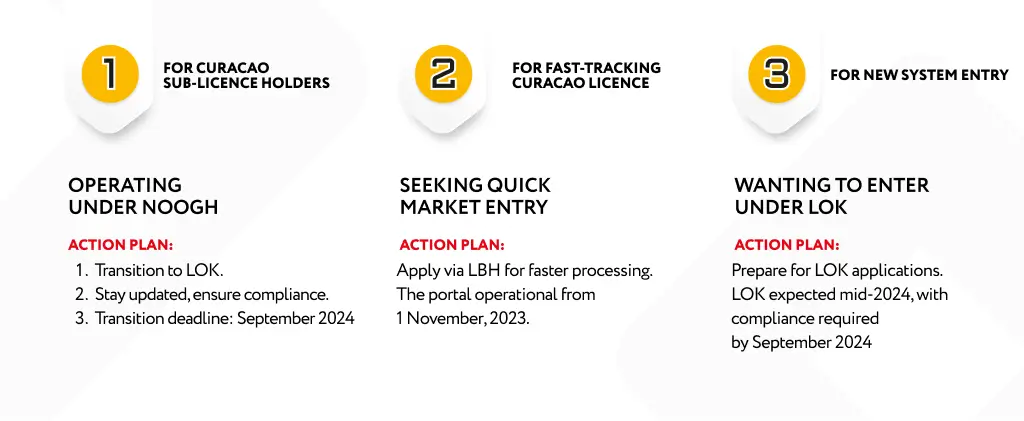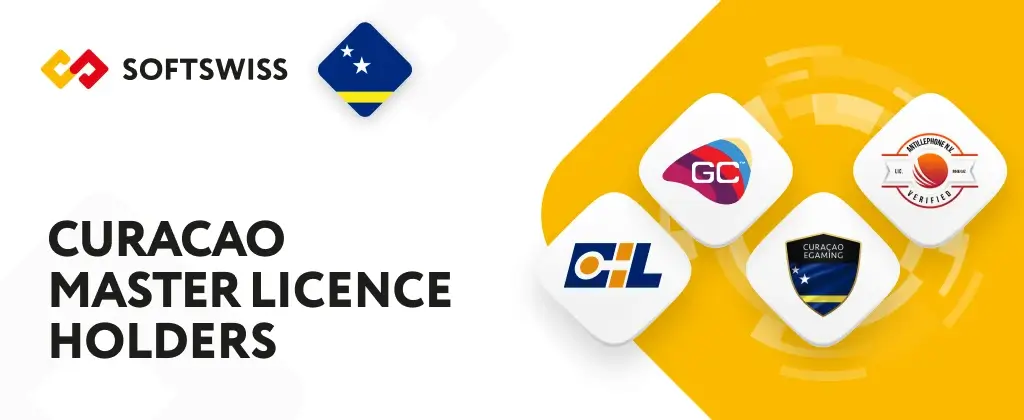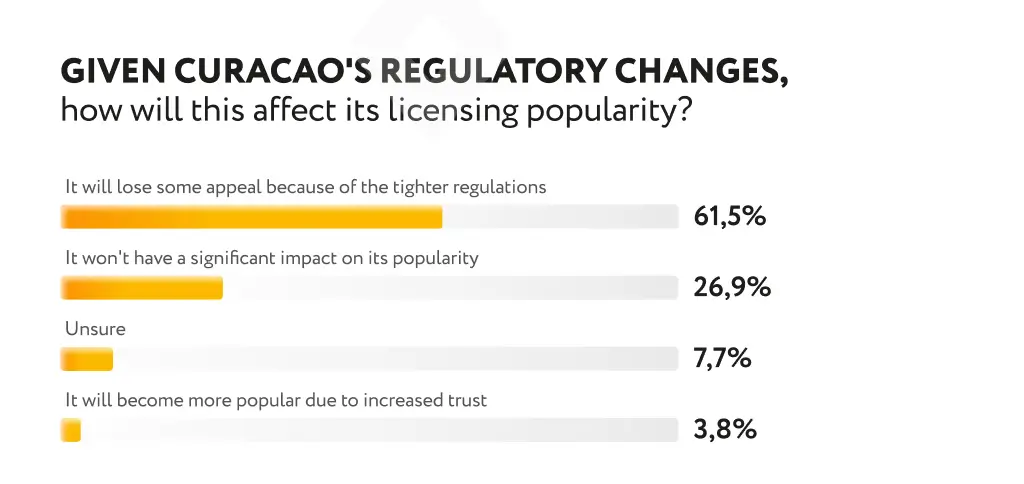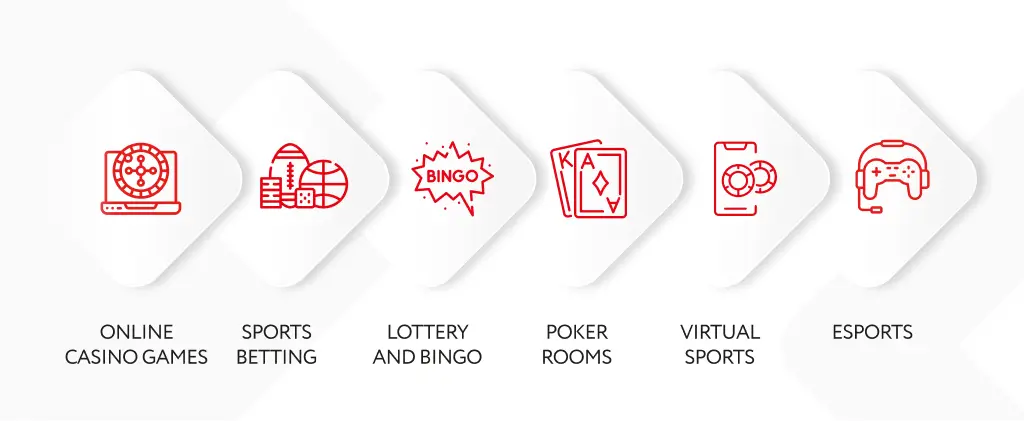All operators know that licensing is linked to legal compliance – a line no one wants to cross, no matter how inadvertently. Regardless of whether a gaming businessman opts for a pre-packaged White Label solution with an included licence, delving into the process and nuances remains vital. This aids in making informed decisions about establishing partnerships with software and payment providers and more.
A Curacao gaming licence, popular among operators of all levels, requires careful consideration due to its recent changes. Here in this guide, we aim to provide you with all the essential details for a thorough understanding of its current state, possibilities, and application process.
TL;DR: Curacao Essentials
Here's a concise overview of the Curacao licence in 2025:
- Simplified Licensing Structure
Gone are the days of master and sub-licences. Now, there are just two types, B2B and B2C, covering all major online gambling activities. - Centralised Authority
All matters related to licensing and compliance will be managed by the newly established Curacao Gaming Control Board (CGCB). - Easy Application Process
Licence applicants can now conveniently submit their applications through an online portal. - One-Year Validity
Licences are valid for one year, but all operators should keep an eye out for potential revocations or changes in legislation. - Scope of Licence
The licence authorises the provision of remote gambling services.
Below is an illustration highlighting several scenarios, one of which might suit your needs.

For those who don’t settle for the bare minimum, let's dive deeper into the specifics.
A Brief Overview and History
This small Caribbean island, nestled within the Kingdom of the Netherlands, is a true powerhouse in online gambling and other business sectors.
Curacao exemplifies a business heaven, uniting a range of industries and niches such as tourism, oil refining, cargo handling, light industry, and financial services. The developed business environment and favourable tax conditions make it a preferred choice for offshore operations by many businessmen.
iGaming is no exception. Dating back to 1993, Curacao issued the National Offshore Gambling Decree, which initiated gambling regulation. The licence issuance started three years after the law's release, marking Curacao’s foray into the promising gambling field.
Before 2023, Curacao’s legal framework for gambling included two types of licences: a master licence and a sub-licence. The master licence, valid for five years and issued by the Ministry of Justice of Curacao, covered a range of gambling activities and allowed holders to sub-licence others. A sub-licence issued by a master licence holder remained valid as long as the master licence did.
Despite the law allowing for any entity to obtain a licence, in reality, only four master licence holders existed. This limitation meant other operators could only seek a licence. Although operating under the same laws, licensees faced varying requirements and conditions, leading to some confusion.

In 2023, there was a significant overhaul. The licence-sharing system was discontinued, and a new licence format was introduced, governed by the Curacao Gaming Authority (CGA). This change, spurred by a proposal from the Netherlands, aimed to establish a more cohesive regulatory framework and improve the jurisdiction's licensing reputation.
The Curacao team doled out these changes at the iGaming NEXT Valletta event in the summer of 2023 with the CGA announcement. This ushered in a big shift, replacing the pre-existing Curacao Gambling Control Board. The jurisdiction has since revamped its licence conditions, embraced digitalisation, and placed a strong emphasis on compliance, transparency, and responsible gaming, marking a new stage in its development.
State in 2025
2023 marked a significant year, with many anticipated changes finally coming to fruition. Among these, the updates to the Curacao gaming licence particularly stand out.
With any transition comes a phase of uncertainty, where outcomes are often unpredictable. However, in Curacao's case, there are already clear foundational principles and the overall direction for the jurisdiction's future.
- The Curacao licensing system now boils down to two main types of certificates: B2B licences for service providers catering to businesses and B2C licences for those interacting directly with players.
- A key focus for Curacao is the strengthening of terms, conditions, and operational requirements. This tightening of regulations will be comprehensive, with particular emphasis on:
- Responsible gambling.
- Higher standards for financial stability.
- Mandatory local presence with an office.
- Enhanced player protection and increased transparency.
- Previously known for its loyal pricing regime, the projected annual and licensing fees are set to rise. Operators mapping out to get a new Curacao certificate now need to budget for an estimated amount of a minimum of EUR 55,000 and more.
Assessing the impact of these changes on the industry and Curacao as a whole is challenging, and time will be the fairest judge. However, steering towards a more transparent and secure entertainment sector will likely enhance players' trust in iGaming. This trust, in turn, can potentially broaden the market for operators. For Curacao, these developments are not just beneficial but also a long-awaited step in its evolution.
Currently, opinions in the industry are subject to change, as it's still too early to form definitive conclusions about these developments.
Nevertheless, recognising the significance of these changes, we conducted a brief external survey to gauge expert opinions on the Curacao updates. The results show a split in perspectives: 60% of experts think these changes might somewhat affect Curacao's popularity, while about 30% believe there will be no impact on its already established appeal. A small fraction, around 4%, even foresee an increase in credibility and popularity over time.

As is often the case, the reality likely falls somewhere in between these views. While the stringent changes and tightening of regulations might initially pose risks, they could positively influence the overall iGaming environment.
On the other side, there's also the concern that new jurisdictions might impose conditions that could unsettle the market. However, such situations tend to find their equilibrium over time, and it's quite possible that Curacao will navigate these changes smoothly.
Curacao Updates Timeline
→ 17 July 2023: The Ministry of Finance reveals plans for the new island's licensing regime as the National Ordinance for Games of Chance (LOK) approaches implementation. All master licences have an additional year to ensure a trouble-free transition.
→ 15 November 2023: The application process for the National Ordinance on Offshore Games of Hazard (NOOGH) master licence commences, marking a new period in Curacao’s iGaming regulation.
→ April 2024: The LOK legislative framework is expected to go live. Entities with NOOGH sub-licences must begin a phased switch within a nine-month window, while others have a shorter span of three months to adapt.
→ September 2024: Deadline for LOK exemptions, signalling the end of the master licence tradition in Curacao. This will conclude the transition period, and all gambling operations must comply with the new LOK regulations.
To ensure an effective transformation, existing holders of Curacao sub-licences have an interim period within which they can switch to the new licence category.
Why Consider Becoming Curacao-Certified?
The Curacao gaming licence has traditionally held several advantages over other systems. Its foremost appeal was the relative ease and affordability of obtaining, making Curacao synonymous with a straightforward start in the industry.
At first glance, the recent tightening of the system might seem to erode some of these unique benefits. However, a deeper look reveals a different picture.
In iGaming, as in many industries, long-term success often hinges on strategic, forward-thinking decisions. The changes to Curacao's licensing system represent such a pivotal shift, especially for those not solely focused on immediate profits. Here are the potential advantages:
- Recognition
Due to its high market penetration, the Curacao gambling licence is one of the most visible and sought-after international licences. Its weighty footprint and established reputation act like a seal of approval, building a foundation of trust with both players and partners.
This is akin to the credibility that comes from associating with a well-certified brand. Furthermore, the current evolution of its rules and structure is a step towards powering its standing, offering long-term benefits for Curacao-licensed casinos and other iGaming brands. - Broad Market Coverage
The Curacao licence is truly global, operating under the maxim ‘what is not explicitly prohibited is permitted’. There are, however, specific exclusions, such as the USA, Germany, France, Australia, the Netherlands, and Curacao itself, and operators should regularly check the current list for any changes. This flexible approach grants licensees substantial leeway in terms of market selection and operational freedom. - Cryptocurrencies
In the 2025 landscape of financial transactions, cryptocurrencies have a significant niche, offering attributes most of us already enjoy – speed, flexibility, independence, and anonymity. For operators, this means tapping into a market of motivated, crypto-literate users is low-hanging fruit for growing playerbase and profits. The Curacao licence accommodates this need, striking a balance between certified gaming operations and the world of crypto transactions. - All-Inclusive Permission
Under the Curacao licence, operators have the liberty to offer a wide array of gambling activities – from slots and lotteries to live games and bingo – all under one umbrella licence. This comprehensive coverage eliminates the need for separate legal approvals for different types of gambling activities, facilitating businesses to experiment and scale up without regulatory constraints.
Types of Gameplay Covered
The multi-activity coverage is a key advantage of the Curacao licence. With the regulator now offering two distinct types of certificates – B2B and B2C – it's worth delving into the specific activities each will encompass.
For the B2B licence, the focus is less on the type of activity and more on the services provided. This licence is ideally suited for entities like game developers or software vendors. It's a standard approach, aligning with the needs of businesses that supply services to other companies in the iGaming industry.
Regarding the B2C licences, there don't appear to be any changes on the horizon. They continue to effectively regulate traditional gaming avenues such as classic casino games, lotteries, bingo, and sports betting under the updated Curacao framework.

Given the legal context, staying informed about current requirements is key to ensuring compliance and effective adaptation to potential changes.
Application Process
While the Curacao gambling licence was often seen as lenient, all those mapping out to submit should not underestimate the application process. The enhanced process is now set to thoroughly investigate and assess stakeholders and the prospective company. To secure the licence and avoid unnecessary expenses, operators must diligently provide all required data upfront.
Keep in mind that the process described here reflects the current situation and may change with new legislation. Stay tuned for updates.
So, what's needed to get a Curacao gambling licence?
- A registered company presence within Curacao.
- A local representative on hand.
- A detailed description of the provided games.
- Clearly outlined website Terms of Use.
- Сonfirmation of the domain ownership.
- At least one physical company server within the jurisdiction.
- Implementation of Anti-Money Laundering (AML) measures for each player.
- Thorough technical audit of each gaming system, including its software.
- Game content certification, specifically the Random Number Generator (RNG) certificate.
- Denying registration to individuals under 18, US residents, and those from the Dutch Antilles.
The Curacao gaming licence list contains a range of specific documents required for the application. The set may vary, but the basics include:
- Notarised passport copies (photo and signature pages).
- Certificate confirming a clean criminal record.
- Address verification documents. e.g. original utility bill.
- CV or resume for key executives and compliance officers.
- Essential documentation (Terms of Service, etc.).
The submission process proceeds online. Licence applicants must download and fill out the following three forms digitally:
- The Online Gaming Application Form
- The Business and Corporate Information Form
- The Personal History Disclosure Form
Once the forms are complete and all paperwork is in place, the candidates should upload the required documents to the portal.
Currently, the review by the regulator takes approximately two months. During this time, they meticulously examine all submitted documents, evaluate the company's financial health, verify certificates, and assess AML practices.
Once this thorough assessment is successfully completed, the newly approved licensee is granted permission to operate under Curacao's jurisdiction for a year.
Fees and Taxes
For any business, the costs associated with obtaining and maintaining a licence are crucial financial considerations. In December 2023, the Finance Minister of Curacao unveiled the new Curacao gaming licence cost.
To provide a clearer vision of ongoing reforms, we have compiled an illustrative table. This comparison emphasises the differences between the current costs of the Curacao licences and the revised fees under the new order (B2C).
| Licence Type | Current Fees* | New Fees (Under LOK) |
| Application Fee | None | ANG 9,000 (EUR 4,600) |
| Due Diligence Fee (per person) | None | Between ANG 250 (EUR 130) and ANG 500 ( EUR 260) |
| Monthly Fee | ANG 7,000 (EUR 3,600) | ANG 4,000 (EUR 2,050) |
| Annual Fee | ANG 36,000 (EUR 18,400) | ANG 48,000 (EUR 24,530) |
| Domain Fee | Included in licence (up to 40 domains; every additional domain beyond that is + ANG 500) |
ANG 500 (USD 260) per annum for an unlimited number of domains |
When evaluating a grand total for both new and current licences, we arrive at the following numbers:
- Current (LBH) Fees: approx. EUR 63,000
- New Total Fees (under LOK): approx. EUR 55,000 with no sub-licences available anymore
Please note that these sums are rough estimates, not exact figures. Operators can use this as a guiding light when calculating future payments.
Why the New System is More Expensive
At first glance, the new system appears less expensive. However, some businesses feel it's actually costlier. Here’s why:
Operation under a sub-licence
Previously, iGaming businesses could opt for cheaper sub-licences from master licence holders. This was a budget-friendly option for businesses of all sizes, allowing for a quick and relatively affordable market entry.
New System
The new rules require every business to have a full independent licence, removing the cheaper sub-licence option. As a result, getting into the market now has a higher financial entry point.
Disclaimer: the data in the table comes from the SOFTSWISS team's research at the time of publishing this article. With the Curacao system currently undergoing reorganisation, make sure to double-check all figures and keep up with any changes.
Moreover, all licensing costs do not include preparation expenses such as obtaining the necessary certificates, setting up an office in Curacao, or legal assistance. As a result, the total cost for each brand will be individual.
Special Offer for Curacao Licensees
If you already hold a Curacao licence and manage your own merchant operations, leveraging the Turnkey Casino Platform can be a strategic play. This option is particularly valuable for seasoned operators seeking a reliable yet adaptable solution.
Here's a clear breakdown of what’s included in the SOFTSWISS Turnkey Casino Package:
- Software
The GLI-19-certified platform is specifically tailored to align with various major licences and country certifications. We believe in constant product evolution and regularly refine the platform to ensure it meets your evolving licensing and certification needs. - Ready-to-Launch Business Framework
Opting for the Turnkey package means you are getting more than just a platform. It includes:- A robust platform capable of handling about six million players monthly.
- Consistent technical updates and maintenance.
- A diverse range of integrated games appealing to both traditional and crypto players.
- A variety of payment methods (including bank transfers, vouchers, cryptocurrencies, e-wallets, and cards) to serve players worldwide.
- Smooth Migrations
Recognising that most licence holders are seasoned players in the market, we provide expertise in seamless brand transitions.
This winning combination, backed by our team's experience, makes the Turnkey Casino Platform a go-to option for those who are ready to cope with the licence on their end. If your goal is securing a Curacao licence, SOFTSWISS is here to guide you every step of the way.
Final Thoughts
In the current iGaming era, the question of licence acquisition is beyond any debate. Today’s brands, even aspiring ones, rarely limit themselves to one jurisdiction. A worldwide society is leaning towards broader acceptance of gambling as a form of safe entertainment, calling for enhanced security – a factor which is highly influenced by licensing.
To summarise, a Curacao licence can be an excellent initial choice or a means to broaden your geographic reach. With the ongoing reforms initiated by its government, Curacao is on track to further strengthen its legal framework.
For those aiming at acquiring or renewing a Curacao licence, it is crucial to keep a close watch on communications from the CGA and to stay abreast of the latest developments, which are likely to be frequent in the near future.
